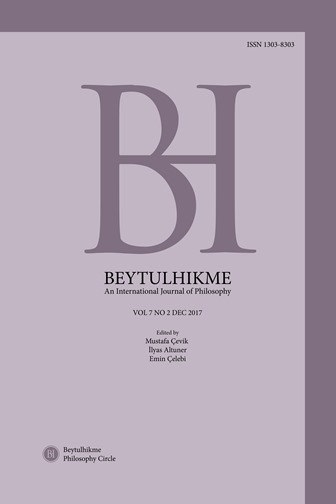Author :
Abstract
Aralarında organik bir bağ ya da etkileşimin söz konusu olmayan iki düşünür: Martin Heidegger (1889-1976) ve Nurettin Topçu (1909-1975), aralarında köklü farklar bulunmakla birlikte, modern olmayan bir düşünme biçimine sahip olmak hususunda birleşmektedirler. Dikkatle bakıldığında, her iki düşünürün bağlandığı temel endişenin, ‘varlık’ sorunu olduğu ortaya çıkmaktadır. Heidegger’in Batı metafizik geleneğine yönelttiği ‘varlık unutulmuşluğu’ ile Topçu’nun Doğu düşüncesine yönelttiği ‘hakikat unutulmuşluğu’ arasındaki paralellik, özellikle modern düşünme biçiminin ürettiği epistemoloji ve ontolojilerin eleştirilmesi hususunda ciddi bir takım benzerlikleri ortaya koymaktadır. Heidegger, var-olan olarak var-olanı düşünen ve böylece ‘varlık’ı unutan düşünme biçiminin kökenlerini Platon’da görmektedir.
Keywords
Abstract
Although there are radical differences between two philosophers, Martin Heidegger (1889-1976) and Nurettin Topçu (1909-1975), both are united in not to have a modern way of thinking. When one looks carefully, it appears that the main concern of both thinkers is the question of being. The parallelism between two ideas, the one is Heidegger’s criticism of the Western metaphysical tradition expressed “forgetfulness of being” and the other Topçu’s criticism of the Eastern thought “forgetfulness of truth”, exposes serious similarities especially critics on epistemologies and ontologies produced by the modern way of thinking. Heidegger sees roots of the way of thinking forgets being in Plato. Turning to equalize truth and right, and reducing being to an idea, this approach constitutes the beginning of humanism. Despite thinking on a Platonic base, Topçu identifies poverty of the thinking advances in the antinomy of rationalism and empiricism, even desperate consequences expose humanity.
Keywords
- Birgül, M. F. (2013). İrade Hareket İsyan. İstanbul: Dergâh Yayınları.
- Caputo, J. (2004). Heidegger’in Düşüncesinde Mistik Unsurlar. Heidegger ve Din (ed. A. Demirhan). İstanbul: Gelenek Yayınları.
- De Towarnicki, F. (2008). Martin Heidegger: Anılar ve Günlükler (çev. Z. Durukal). İstanbul: Yapı Kredi Yayınları.
- Hece Dergisi, (2006), Nurettin Topçu Özel Sayısı. No. 109.
- Heidegger, M. (1998). Teknik ve Dönüş (çev. N. Aça). Ankara: Bilim Sanat Yayınla- rı.
- Heidegger, M. (2001). Platon’un Hakikat Doktrini. Metafizik Nedir? (haz. A. Ay- doğan). İstanbul: İz Yayıncılık.
- Heidegger, M. (2008). Varlık ve Zaman (çev. K. H. Ökten). İstanbul: Agora Kitap- lığı.
- Heidegger, M. (2009a). Düşünmek Ne Demektir? (çev. R. Şentürk). İstanbul: Para- digma Yayınları.
- Heidegger, M. (2009b). Metafizik Nedir? (çev. Y. Örnek). Ankara: Türkiye Felsefe Kurumu Yayınları.
- Heidegger, M. (2013). Hümanizm Üzerine (çev. Y. Örnek). İstanbul: Türkiye Felse- fe Kurumu Yayınları.
- Küçükalp, K. (2003). Nietzsche ve Modernizm. İstanbul: Paradigma Yayınları.
- Massignon, L. (1945-6). La Survie d’al-Hallaj: Tableau Chronologıque de Son Inf- luence Apres Samort. Bulletin d’Études Orientales, 11.
- Massignon, L. (1997). Son Hallâc Yorumcusu Olarak Nurettin Topçu (çev. N. Kalın). Dergâh, 85.
- Topçu, N. (2002). Felsefe. İstanbul: Dergâh Yayınları.
- Topçu, N. (2011a). Bergson. İstanbul: Dergâh Yayınları.
- Topçu, N. (2011b). İslâm ve İnsan. İstanbul: Dergâh Yayınları.
- Topçu, N. (2011c). Varoluş Felsefesi, Hareket Felsefesi. İstanbul: Dergâh Yayınları.
- Topçu, N. (2011d). Yarınki Türkiye. İstanbul: Dergâh Yayınları.
- Topçu, N. (2012). Var Olmak. İstanbul: Dergâh Yayınları.
- Topçu, N. (2015). İsyan Ahlâkı (Notlu Nurettin Topçu Tercümesi ve Eski Harfli Oriji- nali). İstanbul: Dergâh Yayınları.
- Von Aster, E. (1994). Bilgi Teorisi ve Mantık (çev. M. Gökberk). İstanbul: Sosyal Yayınlar.
- Wittgenstein, L. (2011). Tractatus Logico-Philosophicus (çev. O. Aruoba), Metis Yayınları. Öz: Aralarında organik bir bağ ya da etkileşimin söz konusu olmayan iki düşünür: Martin Heidegger (1889-1976) ve Nurettin Topçu (1909-1975), aralarında köklü farklar bulunmakla birlikte, modern olmayan bir düşünme biçimine sahip olmak hususunda birleşmektedirler. Dikkatle bakıldığında, her iki düşünürün bağlandığı temel endişenin, ‘varlık’ sorunu olduğu ortaya çıkmaktadır. Heidegger’in Batı metafizik geleneğine yönelttiği ‘varlık unutulmuşluğu’ ile Topçu’nun Doğu düşüncesine yönelttiği ‘hakikat unutulmuşluğu’ arasındaki paralellik, özellikle modern düşünme biçiminin ürettiği epistemoloji ve ontolojilerin eleştirilmesi hususunda ciddi bir takım benzerlikleri ortaya koymaktadır. Heidegger, var-olan olarak var-olanı düşünen ve böylece ‘varlık’ı unutan düşünme biçiminin kökenlerini Platon’da görmektedir. Anahtar Kelimeler: Heidegger, Nurettin Topçu, metafizik, eleştiri, modern epistemoloji, ontoloji.
